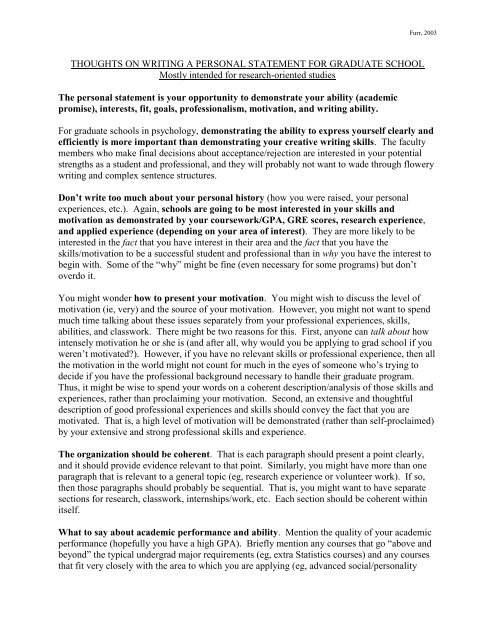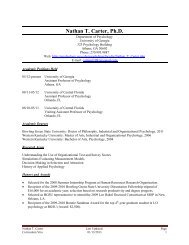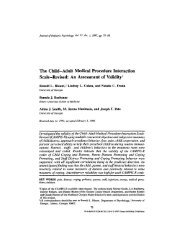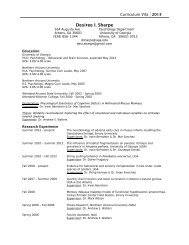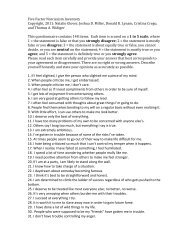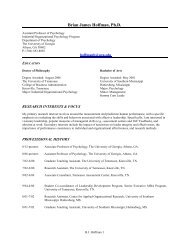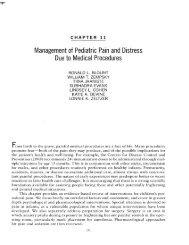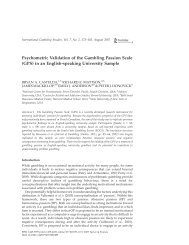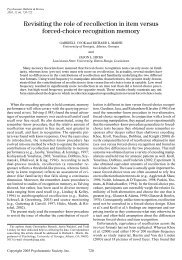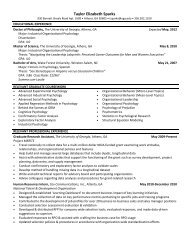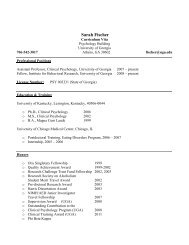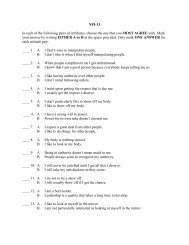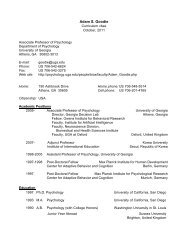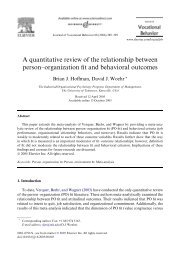Thoughts on Writing a Personal Statement for Graduate School
Thoughts on Writing a Personal Statement for Graduate School
Thoughts on Writing a Personal Statement for Graduate School
Create successful ePaper yourself
Turn your PDF publications into a flip-book with our unique Google optimized e-Paper software.
Furr, 2003<br />
THOUGHTS ON WRITING A PERSONAL STATEMENT FOR GRADUATE SCHOOL<br />
Mostly intended <strong>for</strong> research-oriented studies<br />
The pers<strong>on</strong>al statement is your opportunity to dem<strong>on</strong>strate your ability (academic<br />
promise), interests, fit, goals, professi<strong>on</strong>alism, motivati<strong>on</strong>, and writing ability.<br />
For graduate schools in psychology, dem<strong>on</strong>strating the ability to express yourself clearly and<br />
efficiently is more important than dem<strong>on</strong>strating your creative writing skills. The faculty<br />
members who make final decisi<strong>on</strong>s about acceptance/rejecti<strong>on</strong> are interested in your potential<br />
strengths as a student and professi<strong>on</strong>al, and they will probably not want to wade through flowery<br />
writing and complex sentence structures.<br />
D<strong>on</strong>’t write too much about your pers<strong>on</strong>al history (how you were raised, your pers<strong>on</strong>al<br />
experiences, etc.). Again, schools are going to be most interested in your skills and<br />
motivati<strong>on</strong> as dem<strong>on</strong>strated by your coursework/GPA, GRE scores, research experience,<br />
and applied experience (depending <strong>on</strong> your area of interest). They are more likely to be<br />
interested in the fact that you have interest in their area and the fact that you have the<br />
skills/motivati<strong>on</strong> to be a successful student and professi<strong>on</strong>al than in why you have the interest to<br />
begin with. Some of the “why” might be fine (even necessary <strong>for</strong> some programs) but d<strong>on</strong>’t<br />
overdo it.<br />
You might w<strong>on</strong>der how to present your motivati<strong>on</strong>. You might wish to discuss the level of<br />
motivati<strong>on</strong> (ie, very) and the source of your motivati<strong>on</strong>. However, you might not want to spend<br />
much time talking about these issues separately from your professi<strong>on</strong>al experiences, skills,<br />
abilities, and classwork. There might be two reas<strong>on</strong>s <strong>for</strong> this. First, any<strong>on</strong>e can talk about how<br />
intensely motivati<strong>on</strong> he or she is (and after all, why would you be applying to grad school if you<br />
weren’t motivated). However, if you have no relevant skills or professi<strong>on</strong>al experience, then all<br />
the motivati<strong>on</strong> in the world might not count <strong>for</strong> much in the eyes of some<strong>on</strong>e who’s trying to<br />
decide if you have the professi<strong>on</strong>al background necessary to handle their graduate program.<br />
Thus, it might be wise to spend your words <strong>on</strong> a coherent descripti<strong>on</strong>/analysis of those skills and<br />
experiences, rather than proclaiming your motivati<strong>on</strong>. Sec<strong>on</strong>d, an extensive and thoughtful<br />
descripti<strong>on</strong> of good professi<strong>on</strong>al experiences and skills should c<strong>on</strong>vey the fact that you are<br />
motivated. That is, a high level of motivati<strong>on</strong> will be dem<strong>on</strong>strated (rather than self-proclaimed)<br />
by your extensive and str<strong>on</strong>g professi<strong>on</strong>al skills and experience.<br />
The organizati<strong>on</strong> should be coherent. That is each paragraph should present a point clearly,<br />
and it should provide evidence relevant to that point. Similarly, you might have more than <strong>on</strong>e<br />
paragraph that is relevant to a general topic (eg, research experience or volunteer work). If so,<br />
then those paragraphs should probably be sequential. That is, you might want to have separate<br />
secti<strong>on</strong>s <strong>for</strong> research, classwork, internships/work, etc. Each secti<strong>on</strong> should be coherent within<br />
itself.<br />
What to say about academic per<strong>for</strong>mance and ability. Menti<strong>on</strong> the quality of your academic<br />
per<strong>for</strong>mance (hopefully you have a high GPA). Briefly menti<strong>on</strong> any courses that go “above and<br />
bey<strong>on</strong>d” the typical undergrad major requirements (eg, extra Statistics courses) and any courses<br />
that fit very closely with the area to which you are applying (eg, advanced social/pers<strong>on</strong>ality
Furr, 2003<br />
courses, if you are applying to social/pers<strong>on</strong>ality programs). Hopefully you have a high GRE. If<br />
not, d<strong>on</strong>’t menti<strong>on</strong> it and, <strong>for</strong> crying out loud, d<strong>on</strong>’t say “I d<strong>on</strong>’t test well in standardized exams”<br />
(see “weaknesses,” below).<br />
What to say about research. Faculty are going to be impressed by research experience. There<br />
are at least two issues that you might discuss – the process of doing research and the c<strong>on</strong>tent of<br />
your research experience. Your experience with the process of doing research might be the more<br />
important issue. Faculty members will be looking <strong>for</strong> students who can come into graduate<br />
school and hit the ground running with research activity. The more/better experience you have<br />
with doing research, the more impressed the faculty will be. So, you’ll want to describe some of<br />
the tasks that you have d<strong>on</strong>e (eg planning, data collecti<strong>on</strong>, creating stimuli, analyzing data,<br />
writing, presenting results, attending c<strong>on</strong>ferences, etc.). Faculty members will be particularly<br />
impressed by the more c<strong>on</strong>ceptual activities that you might have engaged in. If you are an author<br />
<strong>on</strong> any products (ie, c<strong>on</strong>ference presentati<strong>on</strong>s and/or publicati<strong>on</strong>s) be sure to menti<strong>on</strong> them<br />
explicitly. Regarding the c<strong>on</strong>tent of your research experience – it would be a b<strong>on</strong>us if the area of<br />
your research matches the area to which you are applying (eg, you’ve worked doing research <strong>on</strong><br />
a pers<strong>on</strong>ality/social project and you’re applying to a pers<strong>on</strong>ality/social program). This is nice,<br />
because it shows the faculty that you have research experience specifically related to their area.<br />
But again, experience in the process of d<strong>on</strong>g research is perhaps the more important issue; if the<br />
c<strong>on</strong>tent fits as well, that’s icing <strong>on</strong> the cake.<br />
If your research background closely fits the area to which you are applying, then you’ll definitely<br />
want to provide more depth about what you have d<strong>on</strong>e. For example, describe the topic, relevant<br />
variables, and results of research projects <strong>on</strong> which you’ve worked. This will dem<strong>on</strong>strate your<br />
familiarity with relevant c<strong>on</strong>tent of the area, in additi<strong>on</strong> to providing evidence of your training in<br />
the process of doing research.<br />
Related to this, within in each secti<strong>on</strong> and/or paragraph, be clear about how the topic speaks<br />
to your skills and ability to c<strong>on</strong>tribute and per<strong>for</strong>m in graduate school. For example, it's<br />
definitely good to have a statement about our research, but you might want to comment <strong>on</strong> the<br />
broader implicati<strong>on</strong>s of this experience – in terms of process and c<strong>on</strong>tent (if possible). Any<br />
research project should provide you with first-hand experience in some fundamental skills and<br />
processes in research. This is the primary benefit of early your research experiences. There<strong>for</strong>e,<br />
you might want to be sure that these skills are explicitly menti<strong>on</strong>ed in your statement. Similarly,<br />
your research experience might have implicati<strong>on</strong>s <strong>for</strong> the area of psychology that you wish to<br />
study in graduate school. Although this is a sec<strong>on</strong>dary aspect of your early research experiences,<br />
it might be possible to make some c<strong>on</strong>necti<strong>on</strong> to your intended area of study (but d<strong>on</strong>’t push it<br />
too far!).<br />
Al<strong>on</strong>g with presenting your strengths, you might need to address your weaknesses. For<br />
example, if you have a GPA that’s lower than you’d like, you might want to address this issue<br />
head-<strong>on</strong>. If there are clear, defensible reas<strong>on</strong>s <strong>for</strong> your lowered per<strong>for</strong>mance (e.g., you really<br />
screwed up during your first year but you got your act together after that, or you had to work 20<br />
hours a week to support yourself), then you might want to point this out. But be very careful,<br />
you d<strong>on</strong>’t want to sound too much like you’re making lame excuses, and you d<strong>on</strong>’t want to call<br />
too much attenti<strong>on</strong> to your weaknesses.
Furr, 2003<br />
Also, al<strong>on</strong>g with presenting your strengths, you’ll want to make clear how the program fits<br />
your interests and goals. In general, you want to: a) show that you are quite familiar with the<br />
program and that you’re not applying haphazardly, and b) provide evidence that your interests,<br />
goals, and abilities fit well with the grad program. For example, menti<strong>on</strong> <strong>on</strong>e or maybe two<br />
faculty members with whom you would be interested in working (particularly <strong>for</strong> PhD<br />
programs). Describe the match of your interests with their work. Note that the two people<br />
shouldn’t be very different from each other – otherwise it’ll seem like you are unfocused and<br />
d<strong>on</strong>’t really know what you want to do. Or, <strong>for</strong> example, some programs offer a “minor” in<br />
certain areas (eg, Quantitative methods) – and you might want to menti<strong>on</strong> an interest in this.<br />
You might want to say something about your short term and l<strong>on</strong>g term goals. Again, you can<br />
describe what you hope to get out of their program. Do you eventually want an academic job<br />
Clinical practice Industry job If you’re not absolutely sure, that’s OK (particularly if you’re<br />
currently an undergraduate), but you might want to menti<strong>on</strong> that you are c<strong>on</strong>sidering, <strong>for</strong><br />
example, an academic career versus and industry job, and that you hope to learn more about that<br />
during graduate school. Perhaps this is c<strong>on</strong>servative, but make sure your goals sound reas<strong>on</strong>able.<br />
You might very well plan to win the Nobel Prize <strong>for</strong> fully integrating Psychology and<br />
Architecture within five years of getting your graduate degree. But perhaps you should c<strong>on</strong>sider<br />
keeping the more grandiose plans to yourself <strong>for</strong> now, and instead emphasize more clearly<br />
manageable and typical goals (eg, “teach and do research as a professor of Social psychology”).<br />
Last but certainly not least, an overarching issue is to be c<strong>on</strong>cise and very clear. The people<br />
reading your statement are probably reading many statements. And frankly, their attenti<strong>on</strong> may<br />
wane during the process – they want to get the relevant in<strong>for</strong>mati<strong>on</strong>, and they want to get it<br />
quickly. There<strong>for</strong>e, you must make your statement as clear and efficient as possible. D<strong>on</strong>’t<br />
ramble <strong>on</strong> and <strong>on</strong>, d<strong>on</strong>’t jump randomly from topic to topic, d<strong>on</strong>’t spend much time talking about<br />
issues that aren’t str<strong>on</strong>gly helping your cause. One way to think about it is that each word costs a<br />
dollar (and you have <strong>on</strong>ly so much m<strong>on</strong>ey) - so you have to spend your words in a way that<br />
maximizes their impact. This overarching issue speaks to every point raised earlier –<br />
organizati<strong>on</strong>, coherence, emphasis of specific topics (eg, skills and professi<strong>on</strong>al experiences over<br />
general motivati<strong>on</strong> and enthusiasm). Make the reader’s job as easy as possible and make sure<br />
that you tell them exactly what they need to know.<br />
See also…..<br />
http://www.psychgrad.org/<br />
http://www.psichi.org/pubs/articles/article_98.asp<br />
http://www.psichi.org/pubs/articles/article_165.asp<br />
http://psych.hanover.edu/handbook/applic2.html<br />
http://www.accepted.com/grad/pers<strong>on</strong>alstatement.aspx<br />
http://www.rider.edu/~suler/gradschl.html<br />
http://www.psywww.com/careers/perstmt.htm


